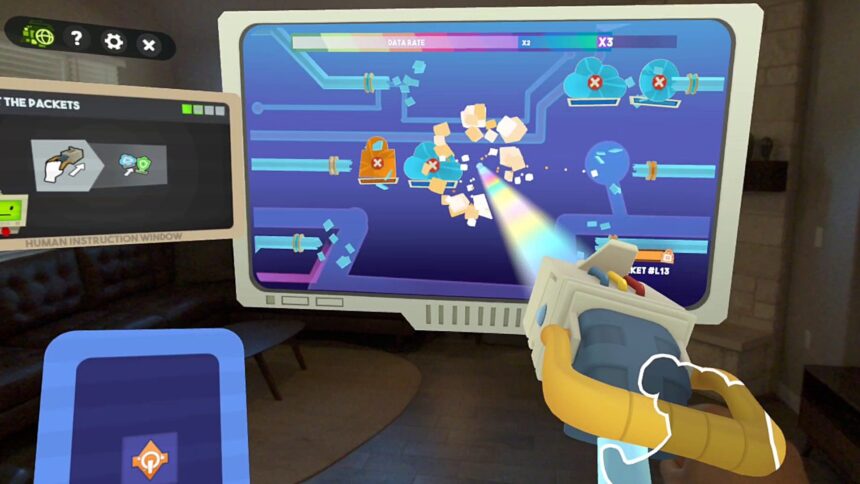Owlchemy Labs, the Google-owned XR studio, launched a brand new blended actuality title solely for Android XR which expands the Job Simulator universe.
The Information
Owlchemy Labs, the studio behind VR video games Job Simulator (2016) and Trip Simulator (2019), launched each video games on Android XR’s first formally supported headset, Samsung Galaxy XR.
Alongside it comes a free blended actuality expertise, known as Inside[JOB], which the studio says in a blogpost gives up the “similar mix of chaos, humor, and hands-on interplay that helped outline trendy VR, in addition to a primary take a look at our subsequent evolution in spatial experiences.”
As an Android XR platform unique, Inside Job isn’t a full title as such, however reasonably what Owlchemy calls an “interactive XR playground,” which places the collection robotic protagonist ‘JobBot’ within the highlight as he discovers your actuality.
In Inside Job, customers tweak system settings, fish for knowledge, and restore PCs in VR, mixing passthrough MR with full VR segments set within the Job Simulator universe. The studio says Inside Job isn’t a sequel as such, however reasonably “an opportunity to experiment with our newest hand-tracking tech whereas fixing a collection of lighthearted repairs.”
The sport launched alongside Samsung Galaxy XR this week, priced at $1,800, which is at the moment the one Android XR headset available on the market. Yow will discover Inside Job at no cost over on the Playstore right here.
My Take
I believe it’s fairly clear that Galaxy XR’s excessive price ticket principally excludes it from being a viable outlet for large-format, system-selling exclusives, which is why players most likely shouldn’t wring their fingers and yell into the heavens with full-on FOMO simply but. Mainly, it’s a Imaginative and prescient Professional, however cheaper, and with entry to Android apps and possibly just a few Quest ports. That’s very cool for XR obsessed individuals such as you and me, and additionally firms trying to construct enterprise apps, however not many others proper now.
The actual query on my thoughts is “what’s actually subsequent for Owlchemy Labs?” I believe the reply to that query received’t materialize so shortly. As a reminder, Owlchemy Labs has developed a few of the best-selling video games within the medium, so that they’re most likely hoping to leap in on the proper second—nevertheless it’s tough to intuit when that may be.
Olwchemy Labs says in a current blogpost that porting their video games to Android XR has allowed them to “experiment with new layers of immersion by native help for hand, eye, and face monitoring.” I can wager different established XR studios are concerned about mobilizing these {hardware} options too, if solely in service of deepening person immersion, however I’m skeptical of whether or not will probably be sufficient.
I’ll admit it: the subsequent XR headset wave might nicely come when shoppers can ultimately select between an affordable and cheerful Android XR headset, a next-gen Quest, and probably even Valve’s rumored Steam Body (aka ‘Deckard’). However I’ve a tough time believing face and eye-tracking alone will probably be additive sufficient to the glut of shoppers. Sure, future headsets will most likely have greater resolutions, extra processing energy, and hopefully be lighter and extra comfy than they’re now. However prone to belaboring the purpose, all of it must hit a actual shopper value level to maneuver the needle.
Notably, there are just a few shopper headsets available on the market with face and eye-tracking at the moment: VIVE XR Elite, Pico 4 Professional, and Apple Imaginative and prescient Professional, the latter of which simply launched its M5 {hardware} refresh for $3,500. None of these have garnered the incumbent shopper help to make them de facto rivals to Meta’s Quest 3/3S platform although. As an apart, Quest 3 is actually a Quest Professional with out face and eye-tracking—or the $1,500 price ticket—which was ultimately decreased to $1,000 to flush inventory earlier than it was discontinued earlier this yr. Meta discovered that lesson early on, it appears.
Assuming the studio desires to proceed pushing the boundaries of immersive design at scale prefer it did with Job Simulator in 2016, I’d think about they’re doing what most builders are at this level: i.e. utilizing these prosumer headsets as advert hoc developer kits in preparation for the subsequent massive shopper headset era but to come back. When that will probably be, I simply can’t say.











